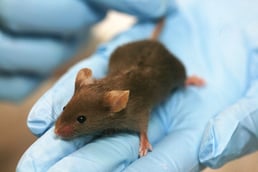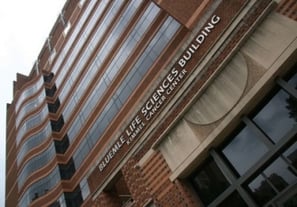The National Cancer Institute awards the University of Illinois at Urbana-Champaign roughly $5 million in research funding each year. This funding supports a number of cancer research projects conducted at the university. One such project is a ground breaking study of nanoparticles that researchers designed to specifically bind to a protein that marks the surface of breast cancer stem cells and destroy them. These elusive and rare cells can cause cancer to come back years after the tumor has been treated.
Read MoreTags: breast cancer research, University of Illinois Urbana-Champaign, cancer research, Cancer Treatment, Cancer, life science researchers, Laboratory Equipment Supplier, lab suppliers, UI Urbana, Midwest Region, UIUC, BioResearch Product Faire, cancer therapy

In 2013, president Barack Obama initiated a public-private partnership - the BRAIN Initiative - to provide more funding and opportunities for institutions and organizations to study the human brain. This project is led by the National Institutes of Health and includes a new five-year collaborative project, the BRAIN Initiative Cell Census Network consortium that is aiming to identify all cells in a mouse brain to create a catalog of these cells.
Read MoreTags: CA, University of Southern California, USC, BioResearch Product Faire Event, NIH award, 2018, brain cell research, BRAIN Initiative
According to the CDC, Every 4 minutes, someone in the United States dies of stroke. That’s 140,000 Americans killed by stokes each year. Stroke is a leading cause of serious long-term disability and costs the United States an estimated $34 billion each year.
To help find new treatment options for the nearly 800,000 people who have stokes each year, a team of scientists at The University of Georgia, Athens have developed a new livestock model that could speed stroke discoveries by providing a better, more predictive transnational model.
Mice are out and pigs are in:
Read MoreTags: biomedical research, University of Georgia Athens, University of Georgia, NIH funded Research Projects, UGA, chemical supply, laboratory equipment suppliers, lab suppliers, BioResearch Product Faire, Laboratory product sales, Biotechnology trade show, NIH awards 2017, 2017 research funding, Brain Repair
The University of Rutgers recently opened the Adult Clinical Research Center on its New Brunswick campus. The Adult Clinical Research Center (CRC) is part of the Robert Wood Johnson University school of Medicine. The center outgrew its previous location on the third floor of the Robert Wood Johnson University Hospital and now occupies the 8th floor of the new East Tower medical building adjacent to the Hospital. This 11,646 square foot facility will make it possible for the CRC to double the number of studies they conduct over the next three years. Currently, there are 36 active and 20 pending clinical trials.
Read MoreTags: biomedical sciences, Bioresearch funding, Rutgers University, laboratory equipment suppliers, new medical buildings, lab products, Rutgers, New research center, BioResearch Product Faire, Biotechnology trade show

Each year, The Sidney Kimmel Cancer Center (SKCC) at Jefferson University Hospital receives approximately $72 million in grants for cancer research from organizations such as Susan Komen for the Cure. This year the SKCC received a $3 million donation from Esperanza and David Neu in order to establish the Neu Center for Supportive Medicine and Cancer Survivorship. The purpose of the Neu Center is to serve as a comprehensive resource for psycho-social care and research.
Read MoreTags: Pennsylvania, Northeast, Thomas Jefferson University, cancer research, NIH funded Research Projects, Philadelphia, PA, NIH funding, Cancer Center, ThomJeff, cancer research funding, BioResearch Product Faire, NIH awards 2017, 2017 research funding
Researchers at the University of Minnesota, Twin Cities have created a new lab-grown blood vessel replacement that is composed completely of biological materials, yet contains no living cells at implantation. It is the first-of-its-kind nonsynthetic, decellularized graft that becomes repopulated with the recipient’s own cells after implanted. This discovery could help tens of thousands of kidney dialysis patients each year. It could also be adapted for use as coronary and peripheral bypass blood vessels and tubular heart valves in the future.
Read MoreTags: sell lab equipment, University of Minnesota Twin Cities, Biomedical Engineering, lab suppliers, UMinn, Lab Product Sales, research news, Kidney Dialysis, BioResearch Product Faire, uminn research, NIH awards 2017
Harvard Medical School, with facilities in the Longwood are aof Boston, is the third oldest medical school in the United States, founded in 1782, and is home to more than 700 students in the M.D. program, more than 140 in the D.M.D program, 556 in the Ph.D. program, and 155 in the M.D.‑Ph.D. program. Harvard Medical School is also affiliated with several teaching hospitals: the Beth Israel Deaconess Medical Center, the Brigham and Women’s Hospital and the Massachusetts General Hospital.
The Longwood Medical Area is known as one of the most prestigious educational, medical and research areas in the United States. Located along Longwood Avenue in Boston, Massachusetts, Longwood Medical Area (LMA) is made up of teaching hospitals, medical facilities, and non-medical facilities; as well as some top educational institutes, such as Harvard Medical School.
Tags: 2014, Harvard University, 2013, Northeast, Longwood Medical Center, Boston, BioResearch Product Faire Event, Research, MA, Harvard, NIH funding
According to the Centers for Disease Control and Prevention 153 people in the U.S. die from injuries that include a traumatic brain injury (TBI) every day. Currently, there are no effective treatments for moderate-to-severe TBIs. So those who do survive their injuries often live the rest of their lives with impaired thinking, memory, or movement. TBIs can also lead to personality and emotional changes. However, research being conducted at the University of Georgia, Athens (UGA) might lead to a treatment that could significantly improve the prognosis of those with brain injuries. This promising research into a glue-like substance for the brain recently won a $1.5 NIH grant award.
Read MoreTags: biomedical research, University of Georgia Athens, University of Georgia, NIH funded Research Projects, UGA, laboratory equipment suppliers, lab suppliers, BioResearch Product Faire, Laboratory product sales, Biotechnology trade show, NIH awards 2017, 2017 research funding, Brain Repair
 White blood cells help the immune system protect the body from infections and diseases. Along with attacking infections, white blood cells also have the ability to bring other cells together to help in the fight. With these known abilities of white blood cells, life science researchers have been researching ways to amplify the abilities of these cells to target specific illnesses, such as tumors.
White blood cells help the immune system protect the body from infections and diseases. Along with attacking infections, white blood cells also have the ability to bring other cells together to help in the fight. With these known abilities of white blood cells, life science researchers have been researching ways to amplify the abilities of these cells to target specific illnesses, such as tumors.
Tags: CA, University of California Davis Medical Center, University of California Davis, Cancer Treatment, Immune System, UCDMC, Sacramento, NIH funding, 2018
 Tuberculosis (TB) is an infectious disease that affects nearly 1/3 of the world's population. Although eradication efforts have been undertaken, none have been successful and TB is still a leading cause around the world. Even though there are treatment methods for this infection, they are not always successful at killing the bacteria that cause TB. This provides life science researchers with more questions and research topics, to better understand the infection and bacteria and what causes treatments to work occasionally, but not always
Tuberculosis (TB) is an infectious disease that affects nearly 1/3 of the world's population. Although eradication efforts have been undertaken, none have been successful and TB is still a leading cause around the world. Even though there are treatment methods for this infection, they are not always successful at killing the bacteria that cause TB. This provides life science researchers with more questions and research topics, to better understand the infection and bacteria and what causes treatments to work occasionally, but not always
Tags: tuberculosis, University of Massachusetts Amherst, new research funding, MA, NIH funding, Amherst, UMASS, 2018, TB Research

